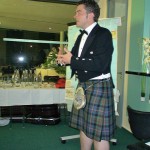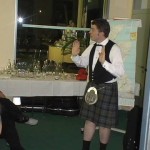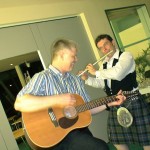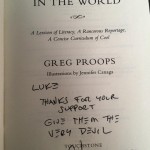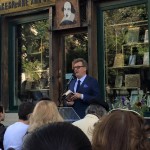It’s Christmas! So in this episode I’m going to read you a classic Christmas story – A Christmas Carol by Charles Dickens. You can read the story as well as listen because the whole thing is included on the page for this episode.
 [DOWNLOAD]
[DOWNLOAD]
Welcome to this special Christmas edition of Luke’s English podcast. I’m feeling very Christmassy here. All my shopping has been done and I’m looking forward to getting together with my family tomorrow. I’m just here with a lovely warm fire, and I’ve managed to find the time to tell you a story in this episode.
But first I’d just like to say Merry Christmas to all of you around the world. I hope you’re spending a pleasant time full of yuletide cheer and festive spirit, even if Christmas isn’t something you celebrate. I usually like to do a special Christmas themed episode of Luke’s English Podcast at this time of year. In the past I’ve done other Christmas episodes and you can check them out if you haven’t already done that.
What are you doing for Christmas this year? Are you doing anything special? As usual I’m going back to my parents’ place for a few days. They live in Warwick, which is in the midlands not far from Stratford Upon Avon, where Shakespeare was born. I expect we’ll be doing the usual Christmas things: eating loads of food, playing lots of games and giving each other presents. I might record a few podcasts with my family too, if we get a break from all the festivities at any time.
In this episode we’re going to eat a nice big slice of Christmas podcast cake, in the form of a classic story by Charles Dickens – “A Christmas Carol”. It’s a story that many people know and is firmly associated with the general sentiment of Christmas in modern Britain, and other parts of the world no doubt – the idea that Christmas is a time of generosity, of stopping your work and focusing on the important things in life, like your family. I’m going to read you a version of this story, which you can find reproduced on the page for this episode if you’d like to read with me. In fact, this episode is almost 100% transcribed.
I found this version on a website called Family Christmas Online. Just go to familychristmasonline.com to find more Christmas themed stuff. Credit should go to Theresa Race Hoffman who edited this version for public readings. http://familychristmasonline.com/stories_other/a_christmas_carol/a_christmas_carol.htm
It’s a reduced version and I’ve also modified it slightly to make some of the language more up-to-date but generally the style is quite similar to the original which was written by Charles Dickens in 1843.
Before I read the story to you, here’s a preface about how A Christmas Carol Made Charles Dickens One of England’s Best-Loved Writers
Preface
Sometime in 1843, Dickens decided to publish a quality Christmas book that would reach people in two ways:
It would use a very original story to plead for compassion for the poor, and
It would be affordable, bringing quality literature in a well-made book to a wide audience.
Dickens’ publisher didn’t believe in the project, so Dickens ended up financing the book himself. He spent money on a quality leather binding and on many quality illustrations, several of which were hand-tinted, an expensive process. As a result, the first printing of A Christmas Carol made very little money, but it rapidly became Dickens’ most popular work. The book was soon reprinted and was adapted for the stage. In later years Dickens often read a shortened version of the story aloud. A Christmas Carol has never faded from popularity since. IN fact there have been a few different film versions of the story, including A Muppets Christmas Carol, starring Michael Caine – which is acually a touching and beautiful telling of the story.
How A Christmas Carol Helped Change the Way We Think About Christmas
By the time A Christmas Carol was published, Christmas in Britain had disintegrated into an excuse for a week of year-end partying. Not only had Christ become absent from English Christmases, but so had compassion, a virtue that Dickens believed that the poor greatly needed, especially at the onset of cold weather each year. A Christmas Carol helped the English, and eventually the people of many countries, gain a new appreciation for Christmas and for the plight of the poor. Perhaps the greatest change was the growing importance of family Christmas celebrations in a culture where the wealthy had often sent their children to the nursery early on Christmas so they could better enjoy their dances and parties. As an example, author Tim Hallinan* claims that December sales of toys rose dramatically in the decades following A Christmas Carol’s publication. Today, many people in the world tend to think of Victorian England as a time and place where Christmas was “done right.” But without the influence of Dickens and this story, such hearty celebrations of good will may never have occurred.
Preface to A Christmas Carol, by Charles Dickens
I have endeavoured in this Ghostly little book, to raise the Ghost of an Idea, which shall not put my readers out of humour with themselves, with each other, with the season, or with me. May it haunt their houses pleasantly, and no one wish to lay it. Their faithful Friend and Servant, C.D.
December, 1843.
So, let’s begin the story. Here it is. A Christmas Carol, by Charles Dickens.
PART 1 – Marley’s Ghost
MARLEY was dead: to begin with. Old Marley was as dead as a door-nail. This must be understood, or this story will mean nothing to anybody. So, we start with the fact that Scrooge’s business partner Marley had snuffed it, he was pushing up the daisies, he was an ex-partner, he’d carked it. He was a goner. He was dead. Scrooge now carried on the moneylending business alone.
He never painted out Old Marley’s name on the door of the office, even though his old partner was – definitely – dead. The company was known as Scrooge and Marley. Sometimes people called Scrooge Scrooge, and sometimes they called him Marley, but he answered to both names. It was all the same to him.
Oh! Scrooge was a selfish old git! He was as cold as a freezing winter night, and he didn’t thaw one degree at Christmas. He hated Christmas and everything it stood for. No ‘season of goodwill’ – for him it was just another excuse to grumble and moan, and stay at home counting his money.
One dark Christmas Eve, old Scrooge sat busy in his counting-house. It was biting, foggy weather.
Scrooge had a very small fire in his office. But next door in his clerk’s office the poor fire was even smaller and barely warm. His poor clerk, called Bob Cratchit had worked for Scrooge for years, and yet had never received a pay rise. Scrooge always paid him the minimum wage.
“Merry Christmas, uncle!” said Scrooge’s nephew Fred coming into the room.
“Bah!” said Scrooge, “Humbug!”
“Christmas a humbug, uncle?” he said. “You don’t mean that do you?”
“If I could work my will,” said Scrooge indignantly, “every idiot who goes about with ‘Merry Christmas’ on his lips, should be boiled with his own pudding, and buried with a stake of holly through his heart!”
The nephew answered, “Don’t be angry, uncle. Come to our place for Christmas tomorrow.”
“Bah, humbug! Christmas! Don’t talk to me about Christmas. It’s all just a big jumped up shopping spree invented by the Americans. The whole thing is just invented to get your money out of your pocket! Well, not mine – I’m keeping mine. You do Christmas your way, and I’ll do it my way. Here on my own, just like every other day, thanks very much!”
“Suit yourself Uncle, but we’ll miss you this year, again” said Scrooge’s nephew. “Merry Christmas, uncle!”
“Good afternoon!” said Scrooge.
His nephew even stopped to wish “Merry Christmas” to the clerk.
The poor, cold clerk, Bob Cratchit, managed a thin smile and a weak “merry Christmas” in return as Scrooge’s nephew left.
As he left, Fred let two other people in. They entered and bowed to Scrooge.
“Mr. Scrooge, or Mr. Marley?” said one of the gentlemen.
“Mr. Marley,” Scrooge replied, “died seven years ago, this very night.”
“Oh, sorry for your loss” said one of the men.
“What do you want?” snapped Scrooge.
“Mr. Scrooge,” said the gentleman, “It looks like it’s going to be an especially freezing winter this year. A few of us are going to buy some meat and drink for the Poor, and some blankets to keep them warm this Christmas. What would you like to give?”
“Nothing,” said Scrooge. “If they’ve got no money they can borrow it, or failing that go to the debtors’ prisons.”
“Many would rather die.”
“If they would rather die,” said Scrooge, “they had better do it, and decrease the surplus population. Good afternoon, gentlemen!”
Scrooge went back to his work.
Meanwhile the fog and darkness and biting cold thickened. Some carol singers walked by Scrooge’s office. One cold young boy stooped down at Scrooge’s keyhole to sing a Christmas carol:
“God bless you, merry gentleman!
May nothing you dismay!”
As soon as he heard it Scrooge jumped up so that the singer fled in terror, leaving the keyhole to the fog.
At length the hour of shutting up arrived. Scrooge nodded to the clerk Mr Cratchit, who instantly snuffed his candle out, and put on his hat.
“You’ll want all day off tomorrow, I suppose?” said Scrooge.
“Yes please Mr Scrooge. It is only once a year after all”
“A poor excuse for picking a man’s pocket every twenty-fifth of December!” said Scrooge. “No day off for you. I expect you to be here extra early next morning.”
Scrooge went home to his gloomy house. The yard was dark and the fog and frost hung about the place.
Now, the knocker on his door was very large and ordinary. But tonight it looked like – Marley’s face.
Marley’s face. The eyes were wide open, and its grayish colour made it horrible in the half light.
As Scrooge looked, it became a knocker again. He did look carefully, but the knocker was still a knocker.
“Load of old nonsense!” said Scrooge to himself.
He closed his door and double-locked himself in. He walked through his rooms to see that all was right and sat by the fire.
“Humbug!” he said. “Stupid Christmas. I’ll be glad when it’s all over and people start acting normally again.”
And then he heard it – a clanking noise, from the cellar, as if some person were dragging a heavy chain.
Scrooge tried to ignore it, and opened his paper.
Then he heard the sound again. The noise of heavy chains being dragged, and a faint sound of moaning.
Scrooge suddenly sat upright in his chair. The noise was real, and it was getting louder.
Suddenly the cellar-door flew open with a booming sound, and then he heard the noise coming up the stairs; then straight towards his door.
Quickly it came on through the heavy door, and passed into the room before his eyes.
It was Marley, back from the dead. The chain Marley pulled was long, and made of cash-boxes, keys, padlocks, and purses. His body was transparent; so that Scrooge could see the two buttons on his coat hanging on the door behind.
“What do you want with me?” said Scrooge. “Who are you?”
“In life I was your partner, Jacob Marley.”
“Humbug, I tell you! humbug!”
At this the spirit raised a frightful cry, and shook its chain. Scrooge fell upon his knees.
Asked the Ghost, “Do you believe in me or not?”
“I do,” said Scrooge. “I do! But why do spirits walk the earth, and why do they come to me?”
“It is required of every man,” the Ghost returned, “that the spirit within him should walk abroad among his fellow men; and if that spirit does not go forth in life, it is condemned to do so after death!”
“You are chained,” said Scrooge, trembling. “Tell me why?”
“I wear the chain I forged in life and by the very work I did, with you,” replied the Ghost. “I made it link by link, and yard by yard; and of my own free will I wore it.” Scrooge trembled more and more.
“Do you know,” pursued the Ghost, “your chain was as heavy as this, seven Christmas Eves ago? You have made it longer, since then.”
“But you were always a good man of business, Jacob,” faltered Scrooge.
“Business!” cried the Ghost, wringing its hands again. “Mankind was my business. Greed was my business! I spent my life on this earth obsessing over money and mistreating the poor and wretched to fill my pocket. Old Scrooge, I am condemned to walk the earth for eternity never to find rest or peace.”
“I am here to-night to warn you,” pursued the Ghost. You will be haunted by Three Spirits.”
“I—I think I’d rather not,” said Scrooge.
“They will come to teach you a lesson. Expect the first to-morrow,” said the Ghost, “when the bell tolls One.”
“Expect the second on the next night at the same hour. The third upon the next night at the last stroke of Twelve.”
When it had said these words, the spectre floated out upon the bleak, dark night.
The air was filled with moaning phantoms, and every one of them wore chains like Marley’s Ghost. They faded away. Scrooge closed the window, and examined the door by which the Ghost had entered. It was still as he had double-locked, with his own hands. He tried to say “Humbug!” but stopped. And he went straight to bed and fell asleep upon the instant.
PART 2 – The First of the Three Spirits
WHEN Scrooge awoke, it was dark. The chimes of a neighbouring church struck the hour, with a single deep, melancholy note.
Light flashed up in the room, and the curtains of his bed were drawn aside by a hand. And Scrooge found himself face to face with the unearthly visitor who drew them, right in front of his face.
It was a strange figure—like a child, or an old man. Its white hair hung about its neck and down its back, and yet the face had not a wrinkle in it. Its legs and feet were bare. It wore a white tunic with a shining belt. It held a branch of fresh green holly in its hand; and had its dress trimmed with summer flowers
“Are you the Spirit whose coming was foretold to me?” asked Scrooge.
The voice was soft and gentle. “I am the Ghost of Christmas Past.”
“Long Past?” inquired Scrooge.
“No. Your past.”
It put out its strong hand and clasped him gently by the arm.
“Rise! and walk with me!”
They passed through the wall, and stood upon an open country road. Now it was a clear, cold, winter day, with snow upon the ground.
“Good Heavens!” said Scrooge. “I was a boy in this place!” He wiped away a tear and begged the Ghost to lead him.
“You recollect the way?” inquired the Spirit.
“Remember it!” cried Scrooge. “I could walk it blindfolded.”
They walked along the road, Scrooge recognizing every gate and tree; until a little town appeared in the distance. Some shaggy ponies trotted towards them with boys upon their backs. All these boys shouted to each other merrily. Scrooge knew and named them every one. “These are but shadows of the things that have been,” said the Ghost. “They do not see us.”
But why was he filled with gladness when he heard them tell each other Merry Christmas, as they parted! What was Merry Christmas to Scrooge? What good had it ever done to him?
“The school is not quite deserted,” said the Ghost. “A lonely child, neglected by his friends, is there still.”
Scrooge said he knew it. And he cried.
They soon approached a large house, its windows broken, and the many rooms cold, and bare of food.
They went, the Ghost and Scrooge, to the back of the house, and a room with desks. At one of these a lonely boy was reading near a feeble fire; and Scrooge sat down, beside his poor forgotten self as he used to be. He said “Poor boy!” and cried again.
“I wish,” Scrooge muttered, after drying his eyes with his cuff: “but it’s too late now.”
“What is the matter?” asked the Spirit.
“Nothing,” said Scrooge. “Nothing. There was a boy singing a Christmas Carol at my door last night. I should have given him something: that’s all.”
The Ghost smiled thoughtfully, and waved its hand: saying as it did so, “Let us see another Christmas!”
And there he was, alone again, when all the other boys had gone home for the holidays.
The door opened; and a little girl came darting in, and put her arms about his neck.
“I have come to bring you home, dear brother!” said the child. “We’re to be together all the Christmas long, and have the merriest time in all the world.”
“Your sister,” said the Ghost. “Always a delicate creature. But she had a large heart!”
“So she had,” cried Scrooge. “You’re right, Spirit!”
“She died a woman,” said the Ghost, “and had, I think, one child – your nephew”
Scrooge answered sadly, “Yes.”
All at once they were in a busy city. Here too it was Christmas time again; but it was evening, and the streets were lighted up.
The Ghost stopped at a warehouse door, and asked Scrooge if he knew it.
“Know it!” said Scrooge. “I was apprenticed here!”
At sight of an old gentleman, behind a high desk, Scrooge cried in great excitement:
“Why, bless his heart; it’s Fezziwig alive again! My old boss!”
Scrooge’s former self, now a young man, came in, beside his fellow apprentice.
Old Fezziwig laid down his pen, and looked up at the clock. He rubbed his hands and called out in a rich voice:
“No more work to-night, my boys!” said Fezziwig. “Christmas Eve, Dick. Christmas, Ebenezer! Clear away, lads!”
It was done in a minute. The floor was swept, the lamps were trimmed, fuel was heaped upon the fire; and the warehouse became a snug, warm, and bright ball-room.
In came a fiddler with a music-book. In came Mrs. Fezziwig, and the three Miss Fezziwigs,. In came all the young men and women employed in the business, the housemaid, the baker, the cook, the milkman. Away they all went, twenty couples at once!
There were dances, and games, and there was cake, and Roast Beef, and mince-pies, and plenty of ale.
During all this time, Scrooge had acted like a man out of his wits. He enjoyed everything. Now that he remembered the Ghost, he became conscious that it was looking full upon him.
“A small matter,” said the Ghost, “to make these silly folks so full of gratitude.”
“Small!” echoed Scrooge. “It isn’t that, Spirit. He has the power to make our work a pleasure or a toil. The happiness he gives, is quite as great as if it cost a fortune.”
He stopped.
“What is the matter?” asked the Ghost.
“Nothing particular,” said Scrooge.
“Something, I think?” the Ghost insisted.
“No,” said Scrooge, “No. I should like to be able to say a word or two to my clerk just now. That’s all.”
Scrooge and the Ghost again stood in the open air.
“My time grows short,” observed the Spirit. “Quick!”
Again Scrooge saw himself. He was older now. He was not alone, but sat by a pretty young girl: in her eyes there were tears.
“It matters little to you,” she said, softly. “Another idol has taken my place. It is the love of money. Good-bye. May you be happy in the life you have chosen!”
“Spirit!” cried Scrooge, “show me no more! I cannot bear it! Leave me! Take me back. Haunt me no longer!”
He was conscious of being exhausted, and of being in his own bedroom. He had barely time to reel to bed, before he sank into a heavy sleep.
PART 3 – The Second of the Three Spirits
Scrooge waited again.
Now, when the Bell struck One, he saw a ghostly light coming from the next room. He shuffled to the door.
A strange voice called him by his name, and bade him enter.
The room was hung with holly and mistletoe, and a mighty blaze went roaring up the chimney. Heaped up like a throne were geese, pies, plum-puddings, chestnuts, oranges, pears, cakes, and punch. Upon this food couch, there sat a jolly Giant, who held a glowing torch high up, to shed its light on Scrooge.
“Come in!” exclaimed the Ghost, “and know me better, man!” Scrooge entered timidly, and hung his head.
“I am the Ghost of Christmas Present,” said the Spirit. “Look upon me!”
Scrooge reverently did so. It was clothed in a green robe, bordered with white fur. Its feet were bare; and on its head it wore a holly wreath, set here and there with shining icicles.
“You have never seen the like of me before!” exclaimed the Spirit.
“Spirit,” said Scrooge, “conduct me where you will. I went forth last night and I learnt a lesson which is working now. To-night, if you have anything to teach me, let me profit by it.”
“Touch my robe!”
Feast, fire, room all vanished instantly and they stood in the city streets on a snowy Christmas morning.
The sky was gloomy, and yet was there an air of cheerfulness like a summer day.
Soon the steeples called the people to church, and away they came, flocking through the streets in their best clothes, and with their happiest faces.
The good Spirit led him straight to Scrooge’s clerk’s, holding on to his robe; and at the door the Spirit smiled, and stopped to bless Bob Cratchit’s dwelling. Think of that! Bob had but fifteen shillings a-week himself; and yet the Ghost of Christmas Present blessed his little house!
Then up rose Mrs. Cratchit, dressed poorly in a worn dress.
“What has ever got your precious father then?” said Mrs. Cratchit to the little Cratchits. “And your brother, Tiny Tim.”
In came Bob, the father, in his threadbare clothes; and Tiny Tim upon his shoulder. Sadly, Tiny Tim held a little crutch!
“And how did little Tim behave?” asked Mrs. Cratchit.
“As good as gold,” said Bob. “He told me, that he hoped the people saw him in the church, because he was a cripple, and it might be pleasant to them to remember upon Christmas Day, who made lame beggars walk, and blind men see.”
At last the dishes were set on, and grace was said. Bob said he didn’t believe there ever was such a goose cooked. Mrs. Cratchit brought in the pudding, like a speckled cannon-ball, blazing with brandy, and with Christmas holly stuck into the top. A wonderful pudding!
Bob proposed a toast:
“A Merry Christmas to us all, my dears. God bless us!”
“God bless us every one!” said Tiny Tim, the last of all.
He sat very close to his father’s side upon his little stool. Bob held his withered little hand in his, as if he loved the child, and wished to keep him by his side, and dreaded that he might be taken from him.
“Spirit,” said Scrooge, with an interest he had never felt before, “tell me if Tiny Tim will live.”
“I see a vacant seat,” replied the Ghost, “in the corner, and a crutch without an owner, carefully preserved. If these shadows remain unaltered by the Future, the child will die.”
“No, no,” said Scrooge. “Oh, no, kind Spirit! say he will be spared.”
“If these shadows remain unaltered by the Future, he will die this year,” repeated the Ghost. “What then? If he is going to die, he had better do it, and decrease the surplus population.”
Scrooge hung his head, ashamed to hear his own words.
“Man,” said the Ghost, “will you decide what men shall live, what men shall die? It may be, that in the sight of Heaven, you are more worthless and less fit to live than millions like this poor man’s child!”
But now Scrooge heard his own name.
“Mr. Scrooge!” toasted Bob; “I’ll give you Mr. Scrooge, the Founder of the Feast!”
“The Founder of the Feast indeed!” cried Mrs. Cratchit, reddening.
“My dear,” was Bob’s mild answer, “Christmas Day.”
“I’ll drink to his health, for your sake and the Day’s,” said Mrs. Cratchit, “Long life to him! A merry Christmas and a happy new year!”
The children drank the toast after her, but they didn’t care for it. Scrooge was the Ogre of the family. The mention of his name cast a dark shadow on the party.
By-and-bye they had a song from Tiny Tim, who had a sweet little voice, and sang it very well indeed.
They were not a handsome family; they were not well dressed. But, they were happy, grateful, pleased with one another, and contented with the time. Scrooge watched them, and especially on Tiny Tim, until the last.
And now, they traveled through coal miners’ homes, past ships on the dark sea. And everywhere they went, no matter how poor, every person hummed a Christmas tune, or had a Christmas thought. And every person, good or bad, had a kind word for another on that day.
Scrooge heard a hearty laugh and recognised it as his own nephew’s. He found himself in a bright, gleaming room, with the Spirit standing smiling by his side.
“Ha, ha!” laughed Scrooge’s nephew. “He said that Christmas was a humbug, as I live! He believed it too!”
“More shame for him, Fred!” said Scrooge’s niece, indignantly.
“He’s a comical old fellow,” said Scrooge’s nephew, “and not so pleasant as he might be. However, his offences carry their own punishment, and I am sorry for him. Who suffers by his ill temper! Himself, always.”
They had some music and played at games; for it is good to be children sometimes, and never better than at Christmas.
They all played and sang, and so did Scrooge, singing quite loud. He begged like a boy to be allowed to stay until the guests departed. But this the Spirit said could not be done.
Much they saw, and far they went, and everywhere the Spirit went he left his blessing. It was a long night, and Scrooge noticed that the Ghost grew older, and he noticed that its hair was grey.
“Are spirits’ lives so short?” asked Scrooge.
“My life upon this globe, is very brief,” replied the Ghost. “It ends to-night at midnight. Listen! The time is drawing near.”
The bell struck twelve. And the Spirit disappeared. As the last stroke ceased to vibrate, he remembered the prediction of old Jacob Marley, and lifting up his eyes, beheld a solemn Phantom, draped and hooded, coming, like a mist along the ground, towards him.
PART 4 – The Last of the Spirits
THE Phantom approached, in a deep black garment, which left nothing of it visible save one boney hand.
“I am in the presence of the Ghost of Christmas Yet To Come?” said Scrooge. “You are about to show me shadows of the things that will happen. Is that so, Spirit?”
Scrooge’s legs trembled beneath him.
“Ghost of the Future!” he exclaimed, “I fear you more than any spectre I have seen. But I know your purpose is to do me good, and I am prepared to bear you company, and do it with a thankful heart. Will you not speak to me?”
It gave him no reply. The hand was pointed straight ahead.
“Lead on!” said Scrooge. “Lead on! The night is precious time to me, I know. Lead on, Spirit!”
The Phantom moved away.
They were in the heart of the city; amongst the merchants; who hurried up and down, and chinked the money in their pockets, as Scrooge had seen them often.
The Spirit stopped beside one little knot of business men, pointing to them, Scrooge advanced to listen to their talk.
“No,” said a great fat man with a monstrous chin, “I don’t know much about it. I only know he’s dead.”
“When did he die?” inquired another.
“Last night, I believe.”
“What has he done with his money?”
“I haven’t heard,” said the man with the large chin, yawning. “It’s likely to be a very cheap funeral, for I don’t know of anybody to go to it.”
“I don’t mind going if a lunch is provided,” laughed one gentleman.
Scrooge knew the men, and looked towards the Spirit for an explanation.
Scrooge fancied that the Unseen Eyes of the ghost were looking at him closely. It made him shudder, and feel very cold.
They went into a dirty part of town where the shops and houses reeked with filth and misery.
There was a shop where greasy junk was bought. Scrooge and the Phantom came into this shop of Old Joe’s, just as two women and a man carried in bundles, laughing.
The man produced his plunder first. A pencil-case and a brooch were all. Old Joe added up his prices, upon the wall.
“I know those things,” Scrooge said. “They are just like mine – and they are worth much more than this man is paying!”
“Who’s next?” said Joe.
Mrs. Dilber was next. Sheets and towels, two old-fashioned silver teaspoons, a pair of sugar-tongs, and a few boots. Her account was stated on the wall in the same manner. “I paid two shillings ten for teaspoons just like those,” Scrooge objected.
“And now undo my bundle, Joe,” said the next woman.
Joe dragged out a large and heavy roll of some dark stuff, the same fabric and color as Scrooge’s bed curtains..
“Bed-curtains!” said Joe. “You don’t mean to say you took ’em down, rings and all, with him lying there dead?”
“Yes I do,” replied the woman. “Why not?”
“His blankets too?” asked Joe.
“Whose else’s do you think?” replied the woman. “And that’s the best shirt he had, and a fine one too. They’d have wasted it, if it hadn’t been for me. Putting it on him to be buried in,” she laughed. “But I took it off again.”
Scrooge looked at a shirt just like his own shirt and listened in horror.
“Ha, ha!” laughed the same woman, when old Joe paid the three out. “This is the end of it, you see! He frightened every one away from him when he was alive, to profit us when he was dead!”
“Spirit!” said Scrooge, shuddering from head to foot. “I see, I see. The case of this unhappy man might be my own. – Merciful Heaven, what is this!”
He recoiled in terror, for the scene had changed, and now he almost touched a bed: a bare, uncurtained bed: on which, beneath a ragged sheet, there lay the body of this man.
He lay, in the dark empty house, with no one to tell his story or mourn his death. “Spirit!” Scrooge said, “this is a fearful place. Let us go!”
The Ghost conducted him to poor Bob Cratchit’s house; and found the mother and the children seated round the fire.
Very quiet. The little Cratchits were as still as statues in one corner, with Peter, who had a book before him. The mother and her daughters were sewing. But surely they were very quiet!
The mother laid her work upon the table, and put her hand up to her face. “ It must be past your father’s time,” she said .
Peter said, shutting up his book. “But I think he has walked a little slower than he used, these few last evenings, mother.”
At last she said, “He used to walk with Tiny Tim upon his shoulder, very fast indeed. But he was very light to carry, and his father loved him so. Ah – there is your father at the door!”
She hurried out to meet him. Bob broke down all at once and cried. He couldn’t help it.
They drew about the fire, and talked. Bob told them of the extraordinary kindness of Mr. Scrooge’s nephew, whom he had scarcely seen but once. “‘I am heartily sorry for it, Mr. Cratchit,’ Fred had said, ‘and sorry for your good wife.’ I am sure we shall none of us forget poor Tiny Tim—shall we?”
“Never, father!” cried they all.
“Spectre,” said Scrooge, “tell me what man that was whom we saw lying dead?”
The Ghost of Christmas Yet To Come did not answer, but led him straight on, until they reached an iron gate.
A churchyard. Here, then; the wretched man whose name he had now to learn, lay underneath the ground
“Answer me one question,” said Scrooge. “Are these the shadows of the things that Will be, or are they shadows of things that May be, only?” The Spirit stood among the graves, and pointed down to one. Scrooge followed the finger, and read upon the stone of the grave his own name, EBENEZER SCROOGE.
The finger pointed from the grave to him, and back again.
“No, Spirit! Oh no, no!”
The finger still was there.
“Spirit!” he cried, tightly clutching at its robe, “hear me! I am not the man I was. Why show me this, if I am past all hope!”
For the first time the hand appeared to shake.
“Good Spirit,” he pursued, “I will honour Christmas in my heart, and try to keep it all the year. I will live in the Past, the Present, and the Future. The Spirits of all Three shall strive within me. I will not shut out the lessons that they teach. Oh, tell me I can sponge away the writing on this stone!”
In his agony, he caught the spectral hand. The Phantom’s hood and dress shrunk, collapsed, and dwindled down into a bedpost.
PART 5 – The End of it
YES! and the bedpost was his own. The bed was his own, the room was his own. Best and happiest of all, the Time before him was his own, to make amends in!
“I will live in the Past, the Present, and the Future!” Scrooge repeated, as he scrambled out of bed. “The Spirits of all Three shall strive within me. Oh Jacob Marley! Heaven, and the Christmas Time be praised for this! I say it on my knees, old Jacob; on my knees!”
His face was wet with tears.
“They are not torn down,” cried Scrooge, folding one of his bed-curtains in his arms, “they are not torn down, rings and all. They are here—I am here—the shadows of the things that would have been, may be dispelled. They will be. I know they will!”
“I don’t know what to do!” cried Scrooge, laughing and crying in the same breath. “I am as light as a feather, I am as happy as an angel, I am as merry as a schoolboy. I am as giddy as a drunken man. A merry Christmas to everybody! A happy New Year to all the world.”
He had frisked into the sitting-room, and was now standing there.
“There’s the door, by which the Ghost of Jacob Marley entered!” cried Scrooge, starting off again, and going round the fireplace. “There’s the corner where the Ghost of Christmas Present, sat! There’s the window where I saw the wandering Spirits! It’s all right, it’s all true, it all happened. Ha ha ha!”
Really, for a man who had been out of practice for so many years, it was a splendid laugh.
“I don’t know what day of the month it is!” said Scrooge. “I don’t know how long I’ve been among the Spirits. I don’t know anything. Never mind. I don’t care!”
The churches began ringing out louder and clearer than he had ever heard. Clash, clang, hammer; ding, dong, bell. What a glorious, glorious sound!
Running to the window, he opened it, and put out his head. No fog, no mist; clear, bright, cold. Golden sunlight; Heavenly sky; sweet fresh air; merry bells. What a glorious Glorious day!
“What’s to-day!” cried Scrooge, calling downward to a boy in Sunday clothes.
“EH?” returned the boy.
“What’s to-day, my fine fellow?” said Scrooge.
“To-day!” replied the boy. “Why, it’s CHRISTMAS DAY sir.”
“It’s Christmas Day!” said Scrooge to himself. “I haven’t missed it. The Spirits have done it all in one night. They can do anything they like. Of course they can. Of course they can. Hello, my fine fellow!”
“Hello!” returned the boy.
“Do you know the poultry shop, in the next street, at the corner?” Scrooge inquired.
“I certainly do,” replied the lad.
“An intelligent boy!” said Scrooge. “A remarkable boy! Do you know whether they’ve sold the prize Turkey that was hanging up there?—Not the little prize Turkey: the big one?”
“What, the one as big as me?” returned the boy.
“What a delightful boy!” said Scrooge. “Yes, yes!”
“It’s hanging there now,” replied the boy.
“Is it?” said Scrooge. “Go and buy it.”
“What!” exclaimed the boy.
“I am in earnest,” said Scrooge. “Go and tell ’em to bring it here, that I may give them the direction where to take it. Come back with the man, and I’ll give you a shilling. Come back with him in less than five minutes and I’ll give you half-a-crown!”
The boy was off like a shot.
“I’ll send it to Bob Cratchit’s!” whispered Scrooge, rubbing his hands, and splitting with a laugh. “He sha’n’t know who sends it. It’s twice the size of Tiny Tim!”
He wrote the address somehow, and went down-stairs to open the street door, ready for the coming of the poulterer’s man. As he stood there, waiting his arrival, the knocker caught his eye.
“I shall love it, as long as I live!” cried Scrooge, patting it with his hand. “It’s a wonderful knocker!— Here’s the Turkey! Hello again! Merry Christmas!”
It was a Turkey!
“Why, it’s impossible to carry that to Camden Town,” said Scrooge. “You must have a cab.”
The chuckle with which he said this, and the chuckle with which he paid for the Turkey, and the chuckle with which he paid for the cab, and the chuckle with which he paid the boy, were only to be exceeded by the chuckle with which he sat down breathless in his chair again, and chuckled till he cried.
He dressed himself up “all in his best,” and at last got out into the streets. The people were by this time pouring forth, as he had seen them with the Ghost of Christmas Present; and Scrooge regarded every one with a delighted smile. Three or four good-humoured fellows said, “Good morning, sir! A merry Christmas to you!” And Scrooge said often afterwards, that of all the happy sounds he had ever heard, those were the happiest in his ears.
He had not gone far, when coming on towards him he beheld the gentleman, who had walked into his counting-house the day before. It sent a pang across his heart to think how this old gentleman would look upon him when they met; but he knew what path lay straight before him, and he took it.
“My dear sir,” said Scrooge, quickening his pace, and taking the old gentleman by both his hands. “How do you do? I hope you succeeded yesterday. It was very kind of you. A merry Christmas to you, sir! Allow me to ask your pardon. And will you have the goodness to allow me to give you” —here Scrooge whispered in his ear.
“Goodnss me!” cried the gentleman, as if his breath were taken away. “My dear Mr. Scrooge, are you serious?”
“If you please,” said Scrooge. “Not a farthing less. A great many back-payments are included in it, I assure you. Will you do me that favour?”
“My dear sir,” said the other, shaking hands with him. “I don’t know what to say—”
“Don’t say anything, please,” retorted Scrooge. “Will you come and see me?”
“I will!” cried the old gentleman. And it was clear he meant to do it.
“Thank you,” said Scrooge. “I am much obliged to you. I thank you fifty times and god bless you!”
He went to church, and walked about the streets, and watched the people hurrying to and fro, and patted children on the head, and found that everything could give him pleasure. He had never dreamed that anything could give him so much happiness. In the afternoon he turned his steps towards his nephew’s house.
He passed the door a dozen times, before he had the courage to go up and knock. But he made a dash, and did it:
“Is your master at home, my dear?” said Scrooge to the girl.
“Yes, sir.”
“Where is he, my love?” said Scrooge.
“He’s in the dining-room, sir, along with mistress. I’ll show you up-stairs, if you please.”
“He knows me,” said Scrooge, with his hand already on the dining-room lock. “I’ll go in here myself, my dear.”
“Fred!” said Scrooge. “Why bless my soul!” cried Fred, “who’s that?”
“It’s I. Your uncle Scrooge. I have come to dinner. Will you let me in, Fred?”
Let him in? It is a mercy he didn’t shake his arm off. He was at home in five minutes. Nothing could be heartier. Wonderful party, wonderful games, won-der-ful happiness!
But he was early at the office next morning. If he could only be there first, and catch Bob Cratchit coming late! That was the thing he had set his heart upon.
And he did it; yes, he did! The clock struck nine. No Bob. A quarter past. No Bob. He was full eighteen minutes and a half behind his time. Scrooge sat with his door wide open, that he might see him come into the Tank.
His hat was off, before he opened the door. He was on his stool in a jiffy; driving away with his pen, as if he were trying to overtake nine o’clock.
“Hello!” growled Scrooge, in his accustomed voice, as near as he could feign it. “What do you mean by coming here at this time of day?”
“I am very sorry, sir,” said Bob. “I am behind my time.”
“You are?” repeated Scrooge. “Yes. I think you are. Step this way, sir, if you please.”
“It’s only once a year, sir,” pleaded Bob, appearing from the Tank. “It shall not be repeated. I was making rather merry yesterday, sir. Ive got a bit of a hangover to be honest, but I’m good for work I promise.”
“Now, I’ll tell you what, my friend,” said Scrooge, “I am not going to stand this sort of thing any longer. And therefore,” he continued, “and therefore I am about to raise your salary!”
Bob trembled. He had a momentary idea of knocking Scrooge down, holding him, and calling to the people in the hospital for help and a strait-jacket.
“A merry Christmas, Bob!” said Scrooge, with an earnestness that could not be mistaken, as he clapped him on the back. “A merrier Christmas, Bob, my good fellow, than I have given you, for many a year! I’ll raise your salary, and endeavour to assist your struggling family, and we will discuss your affairs this very afternoon, Bob! Make up the fires, and buy another coal-scuttle before you dot another i, Bob Cratchit!”
Scrooge was better than his word. He did it all, and infinitely more; and to Tiny Tim, who did NOT die, he was a second father. He became as good a friend, as good a master, and as good a man, as the good old city knew, or any other good old city, town, or borough, in the good old world. Some people laughed to see the alteration in him, but he let them laugh. His own heart laughed: and that was quite enough for him.
He had no further meetings with Spirits ever afterwards; and it was always said of him, that he knew how to keep Christmas well, if any man alive possessed the knowledge. May that be truly said of us, and all of us! And so, as Tiny Tim observed, God bless Us, Every One!

![]() [DOWNLOAD]
[DOWNLOAD]







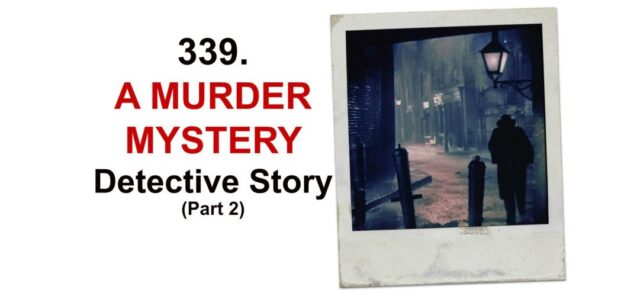




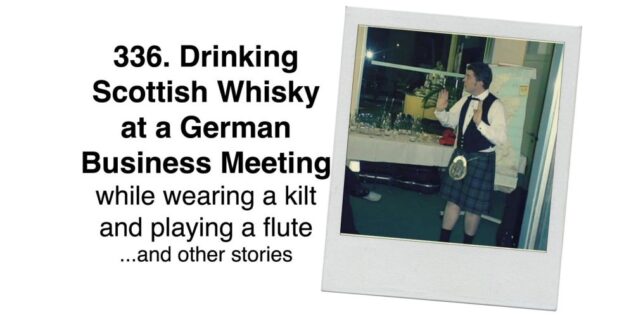
 italki
italki
